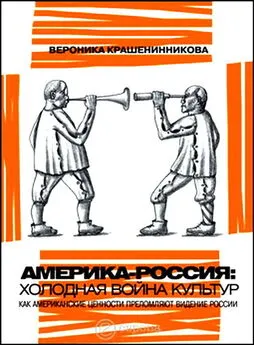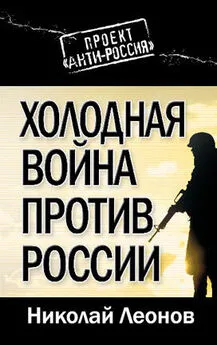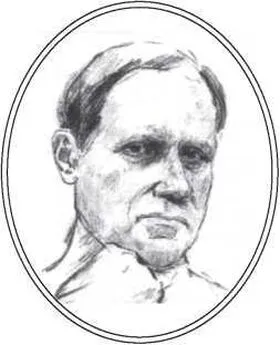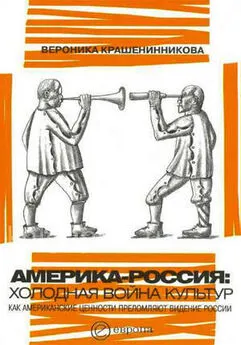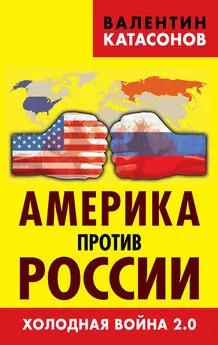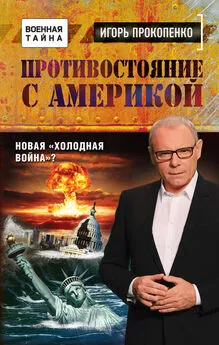Вероника Крашенинникова - Россия - Америка: холодная война культур. Как американские ценности преломляют видение России
- Название:Россия - Америка: холодная война культур. Как американские ценности преломляют видение России
- Автор:
- Жанр:
- Издательство:Европа
- Год:2007
- Город:Москва
- ISBN:978-5-9739-0122-6
- Рейтинг:
- Избранное:Добавить в избранное
-
Отзывы:
-
Ваша оценка:
Вероника Крашенинникова - Россия - Америка: холодная война культур. Как американские ценности преломляют видение России краткое содержание
Что предопределяет несокрушимую убежденность американцев в том, что если они держат иностранцев в тюрьме без суда и без юридической защиты или щедро субсидируют «цветные» бунты против законной власти, то это действие в интересах Добра, тогда как любая попытка противодействия этому нажиму трактуется ими как воплощенное Зло? Как получается, что и республиканцы, и демократы едины в том, что весь мир состоит из потенциальных американцев, которым просто не повезло родиться в США? Что дает американцам чувство абсолютной правоты в их стремлении повсюду утвердить их собственные представления о разумности и справедливости? Почему все то, что мы расцениваем как применение двойных стандартов, американцы воспринимают как самоочевидную истину, потому что они «всегда правы»? На какое основание опирается стопроцентная уверенность президента Буша в том, что развязать войну в Ираке ему повелел сам Бог? Ответы на эти вопросы вы найдете в книге Вероники Крашенинниковой.What defines the American's immovable conviction that extra-juridical detention of foreigners and generous funding for «colored» revolts against legitimate authority constitute an action on behalf of Good, while any attempt to counter this pressure is interpreted as Evil incarnate? How did it come about that both republicans and democrats share the idea that the world consists of potential Americans who were simply not lucky enough to be born in the USA? What gives the Americans that feeling of absolute righteousness in their aspiration to enforce upon everyone else there own perception of what is reasonable and fair? Why, basing their judgment on the concept of their own infallibility, do the Americans regard as self-evident truth that which we perceive as a blatant application of double standards? When President Bush is certain that unleashing war on Iraq was commanded to him by God, what basis does that claim have?You will find the answers to all these questions in Veronica Krashennikova's book.
Россия - Америка: холодная война культур. Как американские ценности преломляют видение России - читать онлайн бесплатно ознакомительный отрывок
Интервал:
Закладка:
79
Thomas Jefferson. Letter to Abbe Arnond. May 27, 1789.
80
Thomas Jefferson. Letter to William C. Jarvis, 1820.
81
Tocqueville A. de Democracy in America.
82
Данные на конец 1980-х годов, см. Lipset S. M. American Exceptionalism: A Double-Edged Sword. New York: W. W. Norton & Company, New Edition, 1997. P. 50.
83
В России и Европе одинаково не доверяют политикам и журналистам // Коммерсант. 2006. 3 августа.
84
Rand A. Atlas Shrugged. New York: Penguin Group, 1996.
85
Friedman M. Capitalism and Freedom, 1962.
86
Locke J. Second Treatise on Civil Government, 1690.
87
James Madison, National Gazette, March 29, 1792.
88
Watson P. Op. cit. P. 503–504.
89
Bailyn B. The New England Merchants in the Seventeenth Century. Cambridge, MА: Harvard University Press, 1979. P. 139–142.
90
Morgan E. S. American Slavery, American Freedom: The Ordeal of Colonial Virginia. New York: Norton, 1975. P. 129.
91
Thomas Jefferson. Letter to James Madison. December 20, 1787.
92
Kohn H. American Nationalism . New York: MacMillan, 1957. P. 24–25.
93
Jefferson quoted in Van Alstyne R. W. Rising American Empire. New York: Oxford University Press, 1960. P. 87.
94
Herbert Croly, quoted in Lieven A. Op. cit. P. 22.
95
Hartz L. The Liberal Tradition in America. New York: Harcourt, 2 ndHarves edition, 1991. P. 9, 307.
96
Hartz L. Op. cit. P. 11.
97
Lieven A. Op. cit. P. 46.
98
Editorial: This Is a Different Kind of War // Los Angeles Times. 2001. October 12.
99
Lieven A. Op. cit. P. 19–20.
100
Lieven A. Op. cit. P. 49.
101
Huntington S. Op. cit. P. 64.
102
Farewell Address to the Nation Oval Office. January 1 1, 1989.
103
Abraham Lincoln, June 26, 1857.
104
Thomas Jefferson. Letter to Archibald Stewart. January 25, 1786.
105
Kissinger H. Diplomacy. New York: Simon & Shuster, 1994. P. 33.
106
Lieven A. Op. cit. P. 6.
107
Marsh Ch. Wayward Christian Soldiers // The New York Times. 2006. January 20. Здесь и далее в параграфе.
108
The State of Disunion: 1996 Survey of American Political Culture, University of Virginia.
109
Quoted in Ellis R. American Political Cultures. New York: Oxford University Press, 1993. P. 24.
110
Watson P. Ideas: A History of Thought and Invention, from Fire to Freud. New York: HarperCollins, 2005. P. 581.
111
Huntington S. Op. cit. P. 75.
112
John Cotton in «Swine and Goat», quoted in Miller P. The American Puritans. New York: Columbia University Press, 1982. P. 314.
113
Kagan R. Dangerous Nation: America's Place in the World from its Earliest Days to the Dawn of the XX Century. New York: Alfred A. Knopf, 2006.
114
Kissinger H. Op. cit. P. 31.
115
Kagan R. Op. cit. P. 356.
116
John Quincy Adams to John Adams, December 21, 1817, in Ford W. Writing of John Quincy Adams. Westport, CT: Greenwood Publishing Group, 1969. P. 275.
117
Woodrow Wilson. Interview. November 5, 1916.
118
Franklin Roosevelt. Speech to the Pan-American Union. Washington DC, April 15, 1937.
119
Rummel R. J. Death by Government. New York: Transaction Publishers, 1997.
120
George Bush. Inaugural speech. January 20, 2005. Available at http://www.whitehouse.gov/inaugural.
121
McDougall W. War and the Military in American History // Foreign Policy Research Institute Bulletin. March 2007. Vol. 12. № 7.
122
Woodrow Wilson. Speech. September 25, 1912.
123
Almond G., Verba S. The Civic Culture: Political Attitudes and Democracy in Five Nations. Newbury Park, CA: SAGE Publications, 1989. P. 4.
124
Wright Mills C. The Power Elite. New York: Oxford University Press, 2000. P. 222.
125
Bacevich A. The New American Militarism. New York: Oxford University Press, 2005. P. 2.
126
Sherry M. In the Shadow of War, The United States Since 1930. New Haven, CT: Yale University Press, 1995.
127
За исключением кровопролитной Гражданской войны, но это был внутренний американский конфликт. В результате южане — единственная группа американцев, знающая, что такое поражение, и испытавшая на себе мощь американской военной машины.
128
Thomas Paine. The America Crisis. December 23, 1776.
129
Thomas Jefferson. Letter to William Stephens Smith. November 13, 1787.
130
Huntington S. Op. cit. P. 260.
131
Lipset S. M. American Exceptionalism: A Double-Edged Sword by Seymour Martin. New York: W. W. Norton & Company, New Edition, 1997. P. 20.
132
Точное число жертв с вьетнамской стороны по-прежнему остается спорным вопросом. Данные цифры приводятся по изданию Summers H. G. The Vietnam War Almanac. Novato, CA: Presidio Press, 1985.
133
Mead W. R. The Jacksonian Tradition. The National Interest. Winter 1999/2000. № 58.
134
Suskind R. The One Percent Doctrine. New York: Simon & Shuster, 2006.
135
Healy D. U. S. Expansionism: The Imperialist Urge in the 1890 s. Madison: University of Wisconsin Press, 1970. P. 216.
136
Lieven A. Op. cit. P. 18.
137
Kissinger H. Op. cit. P. 21.
138
George Washington's Farewell Address. September 17, 1796. Quoted in Kissinger H. Op. cit. P. 32.
139
Schlafly Ph. Beware of Clinton's «Web» of Treaties. Speech prepared for delivery to Christian Coalition's Road to Victory. Washington, D.C.: September 18, 1998. Quoted in Lieven A. Op. cit. P. 16.
140
Уткин А. И. Доктрина Буша: концепция, разделившая Америку // Россия в глобальной политике. 2005. № 4. Июль — август.
141
Krauthammer С. The Perils Of Using 'The Allies'. Washington Post. 2006. August 25.
142
По словам Джеймса Харрингтона (161 1–1677), английского политического мыслителя и основателя классического республиканства.
143
Уильям Исаак Томас (William Isaac Thomas, 1863–1947) — американский социолог; теорема Томаса считается фундаментальным законом социологии.
144
Quoted in Hagstrom W. The Scientific Community. New York: Basic Books, 1965. P. 283.
145
Rosenberg S. Reason, Ideology, and Politics. Princeton University Press, 1988.
146
Kennan G. Soviet-American Relations: 1917–1920. Vol. 1. Russia Leaves the War. New York: Atheneum, 1967. P. 12.
147
Kennan G. Russia and the West under Lenin and Stalin. New York: Mentor, 1962. P. 142–143.
148
Jervis R. Perception and Misperception in International Politics. Princeton, NJ: Princeton University Press, 1976.
149
De Rivera J. The Psychological Dimension of Foreign Policy. Columbus, Ohio: Charles E. Merill Publishing Company, 1968. P. 20.
150
Ranson H. Central Intelligence and National Security. Cambridge, МА: Harvard University Press, 1958. P. 54.
151
Jervis R. Op. cit. P. 217.
152
Bronfenbrenner U. The Mirror Image in Soviet-American relations: A social psychologist's report // Journal of Social Issues. 1961. № 17. P. 45–56.
153
Tannenhaus S. Deputy Secretary Wolfowitz Interview // Vanity Fair. 2003. May 9. Available at Defense Link News.
154
Bruner J. On Perceptual Readiness // Psychological Review. 1957. № 64. P. 129–130.
155
Jervis R. Op. cit. P. 143–144.
156
De Rivera J. Op. cit. P. 28.
157
Quoted in Hagstrom W. The Scientific Community. New York: Basic Books, 1965. P. 283.
158
Jervis R. Op. cit. P. 156.
159
Hawkins D. Power vs. Force: The Hidden determinants of Human Behavior. Carlsbad, CA: Hay House Inc., 2002. P. 257.
160
Mannheim K. Ideology and Utopia. Fort Washington, PA: Harvest Books, reprint edition, 1955.
161
Shils E. Ideology in The Intellectuals and the Powers and Other Essays, ed. E. Shils. Chicago, IL: University of Chicago Press, 1972. P. 24.
162
Wilson R. Op. cit. P. 19–20.
163
Jervis R. Op. cit. P. 144.
164
Holsti O. Perceptions of Time, Perceptions of Alternatives, and Patterns of Communications as Factors in Crisis Diplomacy // Stanford Studies in Conflict and Integration. 1964. October. P. 74.
165
Jervis R. Op. cit. P. 343–344.
166
Сикевич З., Крокинская О., Поссель Ю. Социальное бессознательное. СПб.: Питер, 2005. С. 27.
Читать дальшеИнтервал:
Закладка:
